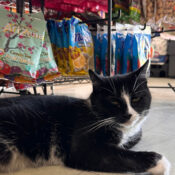Managing editor and logophile Andy Hollandbeck reveals the sometimes surprising roots of common English words and phrases. Remember: Etymology tells us where a word comes from, but not what it means today.
The word duel has long indicated single combat specifically between two contenders. In that du- beginning, people made a connection with similar du- words that indicate “two-ness” — like duo, duet, and the homophone dual — and presumed that all those words must be etymologically linked, that “two-ness” must be inherent in the word duel.
People have followed this train of thought for a long time — since before the word was even found in English writing, even — but it isn’t true. There is no duo in duel.
Duel traces back to the Latin duellum, an Old Latin form of bellum “war” (the source of, for example, belligerent and antebellum). While bellum became the more common form in everyday Latin, the duellum form was retained in poetic uses, similar to how you has completely replaced thou, but thou still finds a place in florid, artistic writing.
Separated from bellum centuries ago, duellum evolved independently. By the Medieval period, and because of the perceived connection to duo (Latin for “two”), duellum had come to indicate a single combat specifically between two individuals. And that’s what the word meant when it finally appeared in the English record (as duelle) in the late 15th century.
So strong is the perceived link between duel and duo that the word truel — a three-person duel, replacing the fancied du- “two” with tr- “three” — was coined by Martin Shubik in his 1954 book Game Theory and Related Approaches to Social Behavior. (However, some people will argue that truel a portmanteau of trio and duel.) As you may guess from the title of this tome, truel finds more use as game theory jargon than it does in describing actual physical battles.
Nonetheless, truels abound in storytelling. Perhaps the most well-known truel involves actors Clint Eastwood, Lee Van Cleef, and Eli Wallach in the movie The Good, the Bad, and the Ugly, but you can also find truels in Reservoir Dogs, the Pirates of the Caribbean movies, and even The Office (American version). There are even two separate short films called Truel, one from 1999 and one from 2013, that explore and exploit the logical conundrum that a truel presents.
Regardless of a misunderstanding of where the word duel came from, today — and for the past few centuries — the word has indicated a one-on-one fight. Before you start calling any battle of any indiscriminate number of contenders a duel — or worse, “correct” someone else’s usage — refer to the first paragraph of this article, the italicized one that I include at the start of every post.
The English language is democratic. Words get their meaning from how English writers and speakers use them, not from their ancient, non-English origins.
Featured Image: Shutterstock
Become a Saturday Evening Post member and enjoy unlimited access. Subscribe now



